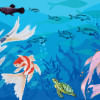The Doppelgänger

It was actually a bit of a relief to sit on the terrace of the Gezira Pension and have a quiet breakfast before plunging back once more into the traffic of Cairo in search of a carriage to the museum.
Typical the day before had been our experience in the imposing Al-Azhar, our delight while wandering through the cool courts of this ancient centre of learning brought to an untimely end by two men in jallabiyas hustling us into an enclosed room and hassling us for money in a particularly menacing manner.
Undoubtedly it was this, along with an accumulation of little brushes further up the Nile, quite apart from centuries of non-believer prejudice concerning Islam, that caused us to jib when a stranger came across the terrace and, oh-so-politely, interrupted our breakfast to ask would we mind if he took our photograph.
We declined his request equally politely and turned back. Atef, for so was the name he gave us, refused to disengage. He understood our reluctance, he said, but he really was a keen amateur photographer, a guest in the same pension and looking across from his own breakfast table, he had been struck by the unusual picture we made under the wrought-iron lamps.
Several coffees later we had become familiar with Atef's story. A Cairene who was a good tennis player, he had met up and often played with an American from the US Embassy at the club and, being one of those "enamoured by the promise of America", had emigrated with the help of this friend. After the usual setbacks experienced by an immigrant, he had established his own small business.
I interjected at this point to recall the welcome I got on my own first border crossing into the US–as a hitchhiker from Canada. A huge poster on the wall at Immigration depicted a smiling hitchhiker on the roadside accompanied by a cadaverous figure at his shoulder holding a knife. "His happy smile", the caption ran, "may hide a murderer's grin. Don't pick him up".
Atef's paean of praise for the American way was more trenchantly countered by my wife Rani, a committed Nehruvian socialist. Atef was dismissive of his native country's experiments with socialism and the two broke several lances on the subject before Rani switched the subject to ask him why he was staying in the pension; did he have no family left in Egypt?
Atef's reply was rueful: He had several siblings in Cairo itself but they were always falling out with one another and his arrival and billeting with one or the other invariably occasioned a further falling out. On his recent visits he had taken the strategic step of staying at the best pension in Cairo, one we had done well to identify for ourselves.
The Gezira Pension, to which we had actually been directed by the neighbouring owner of another whose own was full, was conspicuous for a cleanliness that probably was next to godliness since its owner was a stern, discomforting figure in a jallabiya. He appeared silently in doorways only when required: rather forbidding.
Atef was not dismissive of Egyptian culture as he was of Egyptian politics and, hearing that we were ready to be taken as the artistic types he had initially taken us for, waxed eloquent about the songs of celebrated singer Umm Kulthum such as he felt Rani's ear would be particularly attuned to.
Before we went our separate ways a day or two later, he gave us a tape of her songs along with our photograph looking imperiously Victorian in sepia, we gave him some slim volumes of our verse and, after he had complimented Rani on her command of English while lamenting his own failure to grasp it after so many years in America, we said goodbye. And that was that.
Except it wasn't. Unexpectedly, we did hear from Atef again not so long after. He was coming to London on his way from Boston to see an American feminist friend in Lisbon, an admirer of Umm Kulthum. He had a few hours between flights. Was there any chance of a meeting?
Surprised to hear from him at all, we welcomed his proposal. What notable landmark should we propose where he couldn't miss us? We suggested he take the Tube to Westminster and we meet on the pavement directly beneath Big Ben.
Safely met up, we picked up where we had left off. Atef laughed at our choice of Big Ben: "a symbolic choice typical of poets", he said. We all laughed at our choice of restaurant for lunch. Just across Westminster Bridge was the one-time London County Hall, the H.Q. where Herbert Morrison had presided over Labour's plans to turn perennially free-for-all London into a socialist bastion.
A posh and distinctly unproletarian restaurant now fronted up County Hall and Atef caused further laughter by choosing to order the fish and chips. It was served decorously on a plate attended by special fish cutlery and a cotton napkin, not wrapped up in a page from an old newspaper he twitted Rani he had expected her to find for him. Whenever we were in Boston, he promised, he would return the compliment with bowls of clam chowder down on the waterfront.
Only one incident ever so slightly ruffled the tenor of our little riverside idyll. Towards the end of the meal, beer having been our tipple, I needed to use the toilet. It was reached along a carpeted corridor lined with prints and cartoons redolent of London over the years.
Outside the toilets a man was loitering, though evidently without intent in the sexual sense. Intent he was though, perhaps waiting for someone. But why there? He seemed out of place. If he was Egyptian, as it struck me casually he could have been, he wasn't there to enjoy a plate of fish and chips.
The man was still marking time when I came out again. When I returned to our table, Atef, remarking that travellers wisely take every opportunity to make use of good facilities, also got up to use the toilet. There was a lull that Rani and I took advantage of to settle the bill.
On Atef's return, we proposed strolling along the South Bank to enjoy the river and its vistas until, somewhat belatedly, we realized we needed to hurry him over Hungerford Bridge and put him on the dilatory District Line if he was to be in time for his flight.
And that really was that. We never did hear from Atef again, beyond an email of profuse thanks from the airport in his usual broken English. Not much of a story, is it? Just a description of a casual acquaintanceship.
The next day this pleasant encounter with Atef was quickly forgotten.
News came through on the radio that there had been an attack on several iconic buildings in the United States. Photos began to appear on television of smoke billowing out of the Twin Towers in New York after planes had been driven into them.
Wasn't it just another of those dreadful horror films? That so many lives had been lost and in such a ghastly fashion did not register at first but as photos began to come in of people fleeing pell-mell through the streets, New York more resembled some war-torn place in the Middle East, Gaza perhaps, Benghazi, Beirut or, as the list has grown longer over the years, Baghdad or Damascus.
I was caught up with prolonged contretemps at an employment tribunal and I must confess I did not follow the endlessly headlined story of the astounding attack on America and its life-style so dear to Atef's heart. I did note our Prime Minister's wise comment that the attack required a thoughtful and quite different response from the usual knee-jerk bomb somebody, anybody.
There was one other marginal detail falling out from the attack that did catch my eye. Some days later, fed by who knows what intelligence source, a down-column piece in The Guardian reported there had been operatives on the ground in the United States who had planned and coordinated the 9/11–as we all now call the 11/9–attack.
These operatives, the report added, had quietly and separately slipped out of airports on the East Coast in the days leading up to the attack, flying to London before taking onward flights to diverse destinations in Iberia.
This snippet of information has intermittently niggled at my mind ever since, now a quarter of a century on. What does this persistent itch say about me? Does my sociable self have a shadow alter ego nagging at my shoulder as ready as the poster-boy hitchhiker's to stick the knife into some unsuspecting soul, here the hapless Atef?
Is this heartless doppelgänger so set on telling a sensational story it would seize on a couple of stray meetings with a stranger, drag from the shadows a pair of fleeting figures, one in a doorway in Cairo, the other outside a toilet in London, and wrap the whole lot up in a page from an old newspaper?
John Drew is an occasional contributor to The Daily Star. A collection of his articles, Bangla File, was published in 2024 by ULAB Press.

 For all latest news, follow The Daily Star's Google News channel.
For all latest news, follow The Daily Star's Google News channel. 








Comments